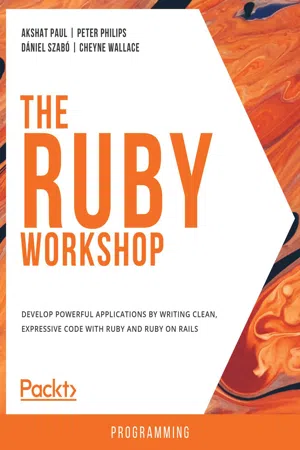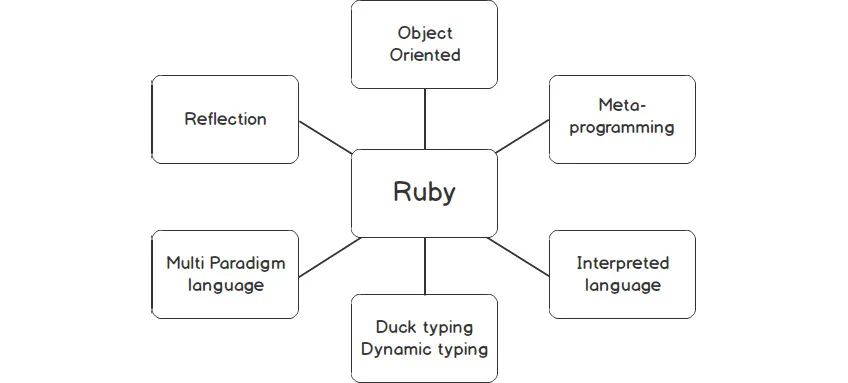
The Ruby Workshop
A New, Interactive Approach to Learning Ruby
- 544 pages
- English
- ePUB (mobile friendly)
- Available on iOS & Android
The Ruby Workshop
A New, Interactive Approach to Learning Ruby
About this book
Get to grips with the fundamentals of the Ruby programming language and learn how to build your own applications with the help of real-world examples and hands-on activities
Key Features
- Learn the fundamentals of Ruby object-oriented programming (OOP)
- Use the Ruby on Rails framework to build interactive web applications
- Discover how to quickly build complex programs with fewer lines of code
Book Description
The beauty of Ruby is its readability and expressiveness. Ruby hides away a lot of the complexity of programming, allowing you to work quickly and 'do more' with fewer lines of code. This makes it a great programming language for beginners, but learning any new skill can still be a daunting task. If you want to learn to code using Ruby, but don't know where to start, The Ruby Workshop will help you cut through the noise and make sense of this fun, flexible language.
You'll start by writing and running simple code snippets and Ruby source code files. After learning about strings, numbers, and booleans, you'll see how to store collections of objects with arrays and hashes. You'll then learn how to control the flow of a Ruby program using boolean logic.
The book then delves into OOP and explains inheritance, encapsulation, and polymorphism. Gradually, you'll build your knowledge of advanced concepts by learning how to interact with external APIs, before finally exploring the most popular Ruby framework? Ruby on Rails? and using it for web development.
Throughout this book, you'll work on a series of realistic projects, including simple games, a voting application, and an online blog. By the end of this Ruby book, you'll have the knowledge, skills and confidence to creatively tackle your own ambitious projects with Ruby.
What you will learn
- Master the syntax and features of Ruby to build useful applications
- Use common design patterns to simplify code and improve efficiency
- Understand how to implement object-oriented programming with Ruby
- Explore ways to fetch, process, and output data
- Work with public APIs and create reusable RubyGems
- Debug code to troubleshoot application behavior
- Create interactive web applications with Ruby on Rails
Who this book is for
The Ruby Workshop is designed for anyone who is new to Ruby and wants a practical introduction to the language. Whether you're completely new to programming, or have experience in another language and want to broaden your skillset, this book will quickly get you up and running.
Tools to learn more effectively

Saving Books

Keyword Search

Annotating Text

Listen to it instead
Information
1. Writing and Running Ruby Programs
Introduction
Key Features of Ruby
- Object-oriented
- Interpreted language
- Duck typing and dynamic typing
- Multi-paradigm language
- Reflection
- Metaprogramming

Object-Oriented
Interpreted Language
Duck Typing and Dynamic Typing
Multi-paradigm Language
Table of contents
- Preface
- 1. Writing and Running Ruby Programs
- 2. Ruby Data Types and Operations
- 3. Program Flow
- Ruby Methods
- 5. Object-Oriented programming with Ruby
- 6. Modules and Mixins
- 7. Introduction to Ruby Gems
- 8. Debugging with Ruby
- 9. Ruby Beyond the Basics l
- 10. Ruby Beyond the Basics ll
- 11. Introduction to Ruby on Rails l
- 12. Introduction to Ruby on Rails ll
- Appendix
Frequently asked questions
- Essential is ideal for learners and professionals who enjoy exploring a wide range of subjects. Access the Essential Library with 800,000+ trusted titles and best-sellers across business, personal growth, and the humanities. Includes unlimited reading time and Standard Read Aloud voice.
- Complete: Perfect for advanced learners and researchers needing full, unrestricted access. Unlock 1.4M+ books across hundreds of subjects, including academic and specialized titles. The Complete Plan also includes advanced features like Premium Read Aloud and Research Assistant.
Please note we cannot support devices running on iOS 13 and Android 7 or earlier. Learn more about using the app